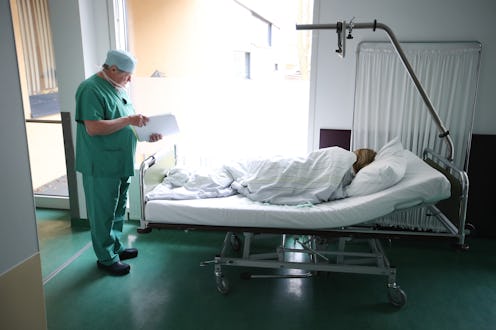News
This UK Study Suggests Heart Attack Care For Men Vs. Women Is Dangerously Unequal

The gender pay gap is well-documented and ubiquitous, with women still earning around just a fraction of what men do for comparable work. But there's a gender gap in health care as well, and according to a new study, it's resulted in over 8,200 women in the United Kingdom dying from heart attacks because they didn't receive the same level of medical care as their male counterparts.
"Currently, a woman who suffers a heart attack has a higher risk of dying than if she were male," Dr. Zachary Whinnett, a cardiologist at Imperial College London, told CNN. "This study found that differences in treatment may be contributing to this increased risk."
The research was carried out by scientists at the University of Leeds and published in the journal Heart. It found that women were more than twice as likely as men to die within 30 days of suffering a heart attack: 5.3 percent of women who had heart attacks died within a month after being diagnosed, compared with just 2.3 percent of men, according to the study.
The study's authors estimated that between 2003 and 2013, 8,243 U.K. women died from heart attacks that wouldn't have killed them if they'd received the same quality of care as men. They noted that the true number is probably higher, as the study only looked at a portion of heart attack cases.
Chris Gales, professor of cardiovascular medicine at the University of Leeds and the report's senior author, told CNN that there's a "false perception that heart attacks are only a male health issues," and cited this as one reason women often don't receive adequate care after suffering heart attacks.
For instance, Gales said, women often don't receive coronary angiographies in a timely manner after being admitted to the hospital for heart attacks. According to his study, women who suffered non-ST-elevation myocardial infarction — a specific type of heart attack — were 34 percent less likely than men to receive coronary angiographies within 72 hours of their admittance to a hospital. Similarly, women who suffered ST-elevation myocardial infarctions — a variety of heart attack in which the coronary artery is completely blocked — were less likely than men to be receive timely reperfusion or stent procedures, or be prescribed beta blockers or statins.
The researchers did note that women who were admitted for heart attacks tended to be older and have more risk factors than men when they entered the hospital. However, the scientists controlled for these factors when carrying out the study, suggesting that inadequate medical care — and not pre-existing risk factors — was responsible for the disparity in men and women's death rates.
"We know women are dying due to unequal heart attack care — and now we've identified the shortfalls we need to target to save lives," Gales told CNN.
The study was funded, in part, by the British Heart Foundation. A 2016 study funded by the BHF concluded that concluded that women in the U.K. are 50 percent more likely than men to receive the wrong diagnoses after having a heart attack — a disparity that, Gales noted at the time, could lead to an "increased risk of death" for women who have heart attacks.